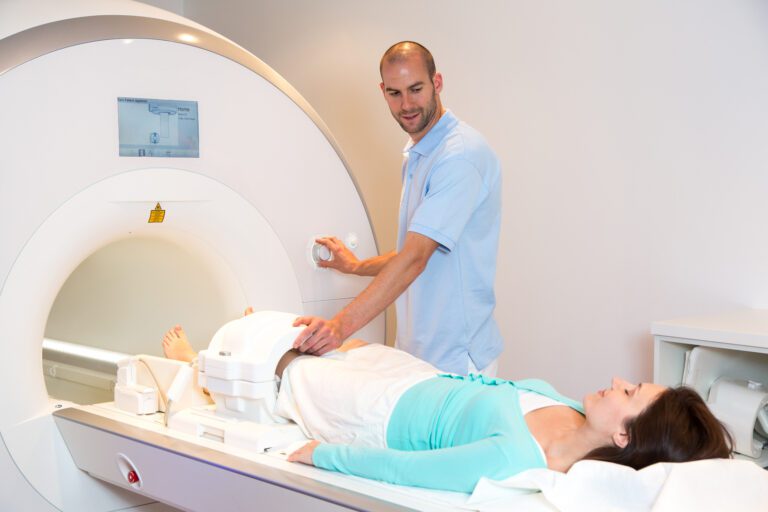When your healthcare provider told you that you need to get an MRI scan because you might have rheumatoid arthritis, you may have felt a little overwhelmed. We’re here to help.
Understanding why your healthcare provider recommended an MRI can help demystify the process of diagnosing and managing rheumatoid arthritis.
If you’re navigating this path for the first time, it’s completely normal to have questions about MRI scans, and to need more clarity about the steps ahead.
Let’s take a closer look at some of the most common questions about getting an MRI to diagnose possible rheumatoid arthritis.
Why did my provider recommend an MRI if they think I might have rheumatoid arthritis?
Your healthcare provider’s recommendation for an MRI is based on its unique ability to provide detailed images of your soft tissues, bones, and joints.
Unlike other imaging modalities, an MRI can capture the details of soft tissues and cartilage, making it an invaluable tool for detecting early signs of rheumatoid arthritis.
This is particularly crucial for rheumatoid arthritis, as early detection and treatment can significantly influence the course of the disease.
By recommending an MRI, your provider is taking a proactive step to understand the extent of any joint damage and inflammation, guiding them in tailoring the most effective treatment plan for you.
How does an MRI contribute to understanding the severity of rheumatoid arthritis?
An MRI doesn’t just reveal the presence of rheumatoid arthritis, but also gives your provider a detailed picture of the disease’s impact on your body.
MRI scans can identify the severity of joint damage and the level of inflammation, factors that are critical in determining the level of your treatment.
By assessing the extent of joint erosion and the thickness of your joint lining, your healthcare provider gains insights into the progression of your condition.
This information is invaluable, not only for establishing a baseline of your condition but also for monitoring how well your body is responding to treatment over time.
Why is MRI the best scan for helping diagnose rheumatoid arthritis?
MRI excels in showing the subtleties of joint and tissue damage, often before you even begin to experience symptoms. This level of sensitivity makes MRI an essential tool for early detection, which is key in preventing the progression of rheumatoid arthritis and maintaining your quality of life.
Furthermore, MRI can differentiate between types of tissue, giving your healthcare provider a comprehensive view of the affected areas, a crucial factor in crafting a personalized and effective treatment plan.
By choosing an MRI, your provider hopes to ensure that you receive the most accurate diagnosis and the best possible care.
MRI scans and early detection of rheumatoid arthritis
Learning about the role of MRI scans in the early detection of rheumatoid arthritis can help guide someone’s healthcare.
If you need an MRI to diagnose rheumatoid arthritis, then it will help to understand how an MRI scan contributes to early diagnosis and treatment.
How can MRI detect early signs of rheumatoid arthritis that other tests might miss?
MRI scans are particularly good at revealing the earliest signs of rheumatoid arthritis, thanks to their exceptional ability to visualize soft tissues, including the synovium (the lining of the joints), and the bone marrow.
These areas are where early signs of rheumatoid arthritis typically show. Unlike other imaging techniques, MRIs can detect subtle changes and early inflammation in these tissues, often before you even feel symptoms.
This sensitivity is crucial, as early detection can halt the progression of the disease and prevent joint damage.
How does an MRI help my provider develop a treatment plan for rheumatoid arthritis?
By illustrating the severity and specific locations of inflammation and joint damage, the MRI allows your healthcare provider to gauge the stage of your rheumatoid arthritis accurately.
An MRI’s ability to monitor changes over time means that your treatment can be adjusted precisely, based on how your condition evolves.
This dynamic approach ensures that your treatment remains as effective and responsive as possible, directly addressing the needs that arise as your condition progresses.
How does early detection help the long-term management of rheumatoid arthritis?
Early detection of rheumatoid arthritis is a strategy that influences the entire course of your disease management.
Identifying the disease early allows for immediate intervention, which is known to slow down the progression of the disease, preserve joint function, and reduce the risk of long-term disability.
Early and accurate detection helps avoid unnecessary treatments and focuses on what is most effective for your specific condition. It sets a baseline for your health, making it easier to track your progress, and adjust your treatment plan as needed.

How to Prepare in Advance for Your MRI
Preparing for an MRI scan might feel overwhelming, but it’s a significant step toward understanding and managing rheumatoid arthritis.
We’ll ease your concerns with clear and comforting insights into what to expect before, during, and after your MRI scan.
What should I know before going for my MRI scan for rheumatoid arthritis?
Make sure to inform your healthcare provider if you have any metal implants, such as pacemakers or joint replacements, as these can affect the MRI’s magnetic field.
MRI machines use strong magnets, so it’s crucial to remove all metal objects, including jewelry, watches, and even hairpins. You may be asked to change into a gown to ensure there’s no metal on your clothing.
Also, it’s a good idea to plan a relaxed, stress-free day. Being calm and rested can make your MRI experience much smoother.
If you tend to feel anxious in enclosed spaces, discuss this with your provider beforehand, and they may be able to offer solutions to make you more comfortable during the scan.
What should I expect during an MRI scan?
An MRI takes about 30-60 minutes, depending on the circumstances of your scan.
During the MRI, you’ll be asked to lie still on a sliding table that gently moves into the MRI machine. The machine itself is large and cylindrical, surrounding the part of your body being scanned.
Once the scan begins, you’ll hear a series of thumping and humming noises, which is completely normal and just the sound of the machine at work.
You won’t feel anything during the scan, but it’s crucial to remain as still as possible to ensure clear, accurate images.
If you have any concerns or questions during the scan, you can communicate with the MRI technician through a microphone.
Will an MRI scan for rheumatoid arthritis be painful?
An MRI scan for rheumatoid arthritis is painless. The most you’ll have to do is to be still for the duration of the scan.
Some people might find staying still for an extended period slightly uncomfortable, especially if they’re already experiencing joint pain due to rheumatoid arthritis. If lying down is painful for you, inform your technician before the scan, and they’ll do everything they can to make you more comfortable.
Additionally, you will be offered headphones to help you relax and reduce the sound of the MRI machine.
Understanding your MRI results for rheumatoid arthritis
Navigating the results of an MRI scan can be intimidating for some people. Your results will include a lot of information that’s important for your healthcare.
In this section, we’ll demystify the results, helping you understand what they mean and how they inform your treatment plan.
How are my MRI results interpreted?
Your MRI results are interpreted by a radiologist, who examines the images for abnormalities or changes and compares them with typical MRI appearances.
They pay particular attention to the soft tissues, bones, and joints, which are areas rheumatoid arthritis commonly affects.
After a thorough evaluation, the radiologist compiles a detailed report, highlighting any findings that may indicate rheumatoid arthritis or other conditions.
This report is then sent to your healthcare provider, who will discuss the results with you, explaining their significance in the context of your symptoms and overall health.
What signs of rheumatoid arthritis show up on MRI results?
MRI is highly sensitive for detecting early signs of rheumatoid arthritis, even before they manifest as physical symptoms.
Some key indicators that radiologists look for include:
- Synovitis: This is inflammation of the lining of the joints (the synovial membrane), a hallmark of rheumatoid arthritis. MRI can visualize synovitis in detail, even in the early stages.
- Bone erosions: These are small damages to the bone near the joint, often undetectable by other imaging methods in the early stages. MRI can identify these erosions early, indicating the onset of rheumatoid arthritis.
- Bone marrow edema: This is swelling in the bone marrow, often associated with pain and stiffness. It’s a sign of active inflammation, and can be a precursor to more significant damage.
How will your MRI results guide the next steps in my treatment plan for rheumatoid arthritis?
The detailed information from your MRI results equips your healthcare provider with a comprehensive view of your condition. This level of detail is crucial in crafting a personalized treatment plan.
If the MRI shows early signs of rheumatoid arthritis, your provider can initiate treatment promptly, aiming to control the inflammation, alleviate symptoms, and prevent or minimize joint damage.
This might involve medication, lifestyle adjustments, or other therapies.
If the MRI indicates advanced rheumatoid arthritis, the treatment plan may be more aggressive, focusing on managing symptoms and improving joint function.
Regular follow-up MRIs can monitor the progression of the disease, and the effectiveness of your treatment, allowing adjustments to be made as necessary.
How to schedule an MRI appointment
Reach out to us at American Health Imaging, and we’ll help you schedule an appointment at an imaging center near you, today.
We’re here to help you get the answers you need.
Frequently Asked Questions About MRIs and Rheumatoid Arthritis
Why did my provider recommend an MRI if they think I might have rheumatoid arthritis?
Your provider recommended an MRI because it can detect the early signs of rheumatoid arthritis, and can help provide a more precise diagnosis.
How does an MRI contribute to understanding the severity of rheumatoid arthritis?
An MRI provides detailed images of soft tissues and joints, helping to assess the severity of rheumatoid arthritis, and monitor disease progression.
Why is an MRI a good scan for helping diagnose rheumatoid arthritis?
An MRI is a good scan for diagnosing rheumatoid arthritis due to its sensitivity in detecting even early and subtle changes in joints and surrounding tissues.
How does an MRI help my provider develop a treatment plan for rheumatoid arthritis?
An MRI helps in developing a treatment plan by providing detailed insights into joint damage and inflammation, guiding personalized and effective therapy.
What should I know before going for my MRI scan for rheumatoid arthritis?
Before your MRI scan, know that you’ll need to remove metal objects and might need to fast or avoid certain medications, depending on your doctor’s instructions.
What should I expect during an MRI scan?
Expect to lie still inside the MRI machine for up to an hour, and you may hear loud tapping or thumping sounds during the scan.
How are my MRI results interpreted?
MRI results are interpreted by radiologists who analyze the images for signs of joint inflammation, damage, and other indicators of rheumatoid arthritis.
How will your MRI results guide the next steps in my treatment plan for rheumatoid arthritis?
Your MRI results will guide treatment by helping your healthcare provider tailor your therapy based on the extent and location of joint damage and inflammation.
